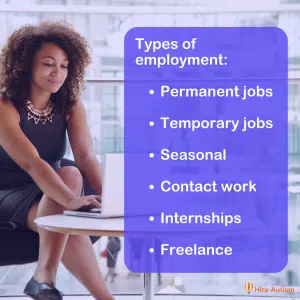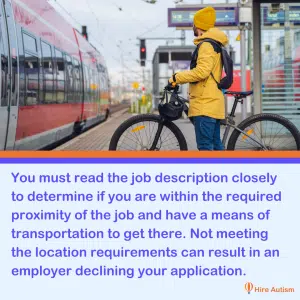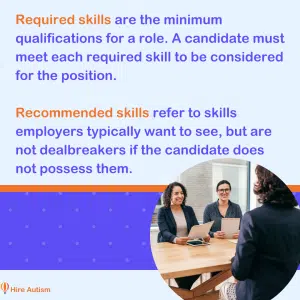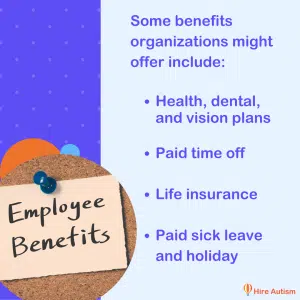The more closely your job application aligns with what the company is seeking, the more likely you will receive a call back from a hiring manager and move forward in the next steps of the hiring process. Tailoring your job search materials and applying for jobs takes time and energy, so it is essential to ask yourself questions such as, “Why do I want this job?” and “Is this opportunity truly worth pursuing right now?” before submitting a job application. This article will help you answer these questions and more.
Type of jobs

Permanent jobs have no end date and can come with many benefits such as healthcare coverage, retirement contributions, and paid time off. Some reasons one might want to go into a permanent role might be their wanting to leverage their work connections in the industry, wanting to plan their career out, or wanting to receive certain benefits.
Some other types of jobs include internships, seasonal jobs, and self-employment.
Internships are temporary roles that can offer someone starting in an industry valuable hands-on, practical work experience within a professional organization. They can also provide insight into a company’s culture and daily operations.
Seasonal jobs are temporary work that typically recurs around the same time every year and can range in duration from a few weeks to a few months. Some examples of such work include retail/shopping industries, restaurants, lifeguards, and snowplow companies.
A few other types of jobs you might encounter are freelance and contact work. Freelance work is a non-permanent, self-employed worker who provides services to a variety of different organizations. As they are not bound by a specific organization, freelance employees can work with as many clients as they see fit. Additionally, freelancers are sometimes given the opportunity to set their own rates, process tax payments independently, and choose where and when to work. Some freelance positions could include journalism, copywriters, graphic designers, and web programmers.
A contractor is an independent employee who may work for many clients simultaneously. These jobs usually involve taking on larger projects for longer-term clients.
Additionally, any of the above job types can be full-time or part-time employment. There are several key differences to understand between a part-time and full-time opportunity.
One of the most significant differences is the number of hours worked per week. Full-time jobs often require employees to work between 30 and 40 hours or more per week, while part-time jobs are usually less than 30 hours per week. Part-time employees might also not be paid for taking time off work, while full-time employees generally get paid time off as part of a benefits package.
Even within the same company, the benefits offered to part-time and full-time employees may differ. Many full-time employees are eligible for bonuses, insurance coverage, paid time off, sick leave, and retirement plan options. Part-time employees, on the other hand, may qualify for fewer or even no benefits.
Lastly, although requirements are usually tailored towards the job, itself, some part-time roles require additional education and certification, whereas some full-time roles require a specific level of educational attainment (and sometimes even a background related to the place of employment).
Location and Transport

You can begin by asking yourself:
- Do I have a means of transportation to get to this job?
- How much time and energy will I be spending commuting and traveling to work?
- Does this job have a remote option?
If the job description of the organization you are applying to says it offers “remote work”, it is important to check what this encompasses as it can mean different things to different organizations. A few different types of remote work include:
- Work from home: Typically requires the employee to be working from their residential space and have a dedicated home office setup.
- Work from anywhere: Typically allows the employee to work remotely from any location.
- Flexible or hybrid work: A regular in-office job that offers a telecommuting option.
Unless a job posting specifies relocation offered, not considering this can result in an employer declining your application because you do not meet the proper location requirements.
It is very important to assess not only your means of transportation, but also your own bandwidth and capacity. Waking up early to drive to work or using an overwhelming and overstimulating metro system daily can be exhausting. Working seven or eight and a half hours a day, only to realize you have to drive an hour to get home in traffic, might lead to burnout. Considering your needs is critical to your ability to perform and retain employment.
Job responsibilities and skills

While employers do not expect candidates to meet 100% of the skills they seek, there is a clear distinction between required and recommended skills.
“Required skills,” are minimum qualifications for a role. In most cases, you must meet each required skill to be considered for the position.
“Recommended skills” or “preferred” skills, on the other hand, refer to skills that employers typically want to see from new hires but are not dealbreakers if the candidate does not possess them.
Employers often highlight the skills and responsibilities that are most important to the role for which they are recruiting in the job description as keywords. Read our previous article Understanding Keywords and Applicant Tracking Systems to learn more.
Salary and Benefits

It’s important to ask yourself, “What salary do I need? What are my current expenses?”
When starting in an entry-level position, you will most likely earn less as you are just beginning your career. If you are unsure about the salary that would work best for you, spend time researching the average salary range for the roles you are considering.
Employers often list the salary range in the job description or discuss salary expectations in the interview. It is essential to be prepared to advocate for your salary goals and how much you are willing to compromise.
While salary is important to consider, more income does not always mean it is the best job opportunity. To make the best decision, you will want to consider the entire package. Does the organization offer benefits that align with your needs?
Some benefits an organization might offer are:
- Health, dental, and vision insurance
- Life insurance
- Flexible spending accounts or health savings accounts
- Paid vacation and sick time
- Paid holiday
- Paid medical leave
There are oftentimes trade-offs regarding benefits, and it is important to consider all aspects of your personal life and whether the benefits are sufficient to accommodate your needs. Sometimes, there might be immediate needs to tend to, such as one’s child or a sick relative, meaning an organization offering more paid time off or paid medical leave might be more desirable than a job with a higher salary. Waiting periods, or how long until you have access to benefits, can vary between companies, so this is another issue to consider.
Company Reputation and Values
One final consideration is the reputation and values of a company. Gaining a clear understanding of a company’s reputation and values can provide you with invaluable information on how its employees are treated and overall workplace satisfaction so that you can determine if the company is a good fit for you.
A great first step is to research the company by going to the company website. You can often find information about the organization’s mission, values, and goals.
Additional examples of ways you can gain insight into a company’s reputation include their social media posts and through third-party sites such as Glassdoor. This can provide you with insider knowledge about the accessibility, inclusion, culture, management style, and goodness of fit of the organization. While sites like Glassdoor can provide helpful information, it’s important to recognize that they can also be heavily biased and may not present a complete picture. To reduce the chance of bias in what you read, it is essential to review multiple sources when seeking information on a company.
In conclusion, applying for a job is more than just submitting a resume; it’s about aligning your skills, values, and goals with the right opportunity. By carefully considering these factors, you can make informed decisions that support your long-term satisfaction and success in a role. Taking the time to thoughtfully evaluate the ‘why’ of your job search can make all the difference in landing a role that truly fits you.
Resources:
- A Guide to Job Searching
- 13 Things To Consider When Looking for a Job
- Permanent vs. Temporary Employees: Benefits and Disadvantages
- Part-Time vs Full-Time: How Many Hours & How to Classify?
- What Is the Purpose of an Internship? (Plus Tips)
- What Are the Most Common Types of Seasonal Work?
- What Is Self-Employed Work and Why Do People Pursue It?
- Q&A: What Is Remote Work?
- Applying for a Job Without all the Qualifications? Here’s What You Need to Know.
- Entry-Level Salary: What You Need To Know
- 10 of the Most Common Employee Benefits in 2024


